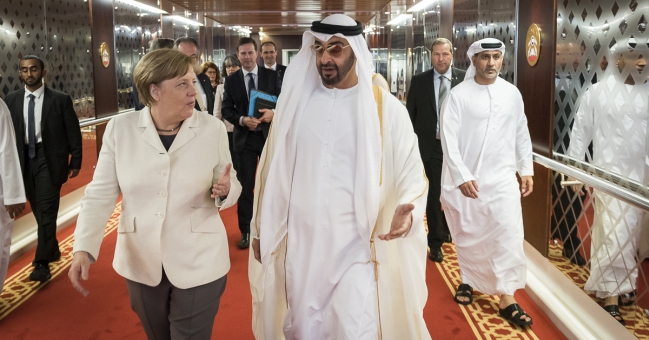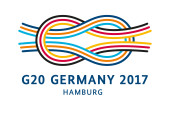Angela Merkel visits the Gulf
Important actors in the region
As part of the preparations for the G20 summit, Chancellor Angela Merkel has visited Saudi Arabia and the United Arab Emirates. Topics on the agenda included climate change mitigation and women's rights, as well as efforts to find a political solution for Syria and Yemen.
 The Chancellor discussed conflicts in the region with the Crown Prince of Abu Dhabi
Photo: Bundesregierung/Kugler
The Chancellor discussed conflicts in the region with the Crown Prince of Abu Dhabi
Photo: Bundesregierung/Kugler
On Sunday and Monday Chancellor Angela Merkel visited Saudi Arabia and the United Arab Emirates. Her visit served to prepare for the G20 summit in Hamburg.
Talks in Jeddah about G20 summit
King Salman bin Abdul Aziz al-Saud of Saudi Arabia will be attending the G20 summit in Hamburg in July. On Sunday, Chancellor Angela Merkel met with the Saudi Arabian head of state in Jeddah to explore common ground.
After her talks she met with Crown Prince Mohammed bin Nayef, who is also Minister of the Interior and with Deputy Crown Prince Mohammed bin Salman, Saudi Arabia’s Minister of Defence.
"A high level of agreement" on the G20 agenda
There is a high level of agreement on the G20 agenda, reported Angela Merkel, following her meetings, in terms for instance of engagement for Africa.
The two sides also agreed about Saudi Arabia’s contribution to the development of the global economy. "Saudi Arabia knows that it is integrated in the global economy, and that the drop in oil prices will force it to make significant reforms, which it is already addressing," said Angela Merkel.
Good progress is being made on expanding the use of renewable energies, and there is a growing understanding of the need for energy efficiency. "But the whole area of climate change mitigation can indeed be a bit more difficult to negotiate," she conceded. This is a matter on which there are also other partners with whom we must negotiate, she added.
Bilateral relations
The second point on the agenda was bilateral relations. "We have the 2030 Agenda, which is Saudi Arabia’s answer to falling oil prices and the transition to a non-oil society or a society in which oil plays a less important role." Saudi Arabia must develop future perspectives here, said the Chancellor. The country is interested in having German industry contribute. "That is why German industry has signed important agreements in this context."
The 2030 Agenda is not only economic in nature. It also means opening societies. It offers prospects for the future for young people in particular - "and specifically more opportunities and rights for women" added the Chancellor. The goal of the 2030 Agenda is to see 30 per cent more women in gainful employment by 2030. Earlier in the day Angela Merkel had met with Saudi Arabian women. "There are difficulties in terms of how women find their role, but there are also success stories. Women made both these points clear here," she said.
Cooperation on security
The German government has a major interest in cooperating with Saudi Arabia in the field of security policy. Saudi Arabia is an important part of the anti-IS coalition.
Germany supports Saudi Arabia in the fight against terrorism, said the Chancellor. In the presence of the Chancellor and King Salman it was agreed that the Bundeswehr would train Saudi Arabian soldiers in Germany. The Ministry of the Interior also agreed to step up training for border officers, railway police officers and aviation security experts. Women too are to be trained in future.
Conflicts in Syria and Yemen
The political future of Syria and Yemen played an important part in talks. Saudi Arabia, in its capacity as a major player in the region, can contribute to resolving the conflicts, said the Chancellor.
In Yemen, the German government trusts in the UN-led process to find a diplomatic solution. "We do not believe that there can be a military solution to this conflict," stressed Angela Merkel.
Germany has offered to support the UN process with its own diplomatic options. This suggestion was positively received in Saudi Arabia. "We will now undertake the pertinent coordination work with the United Nations Secretary-General, with whom I also talked before I left Germany," said the Chancellor.
Angela Merkel in the United Arab Emirates
On Monday the Chancellor flew on to Abu Dhabi, the capital of the United Arab Emirates. This was a return visit. Crown Prince Sheikh Mohammed bin Zayed al Nahyan visited Chancellor Angela Merkel in Meseberg last May.
In Abu Dhabi too Angela Merkel discussed ways of resolving international crises. Alongside Yemen and Syria, Libya is important, said the Chancellor. The United Arab Emirates have demonstrated a high level of engagement on Libya.
Close relations
Angela Merkel pointed to the close bilateral relations that exist between the two countries. A strategic partnership has been in place since 2004, and the two countries have maintained diplomatic relations for 45 years. Over this period, extremely close economic relations have developed, in particular in terms of German exports, reported the Chancellor.
The United Arab Emirates too are working to reduce their dependency on oil. Abu Dhabi is home to the headquarters of the International Renewable Energy Agency. The two countries are cooperating very intensively on expanding the use of renewables, said Angela Merkel.
She also spoke to the Crown Prince about a free trade agreement between the EU and the Gulf Cooperation Council member states. It is a question of pushing ahead with negotiations and stepping up economic relations with the region, said Angela Merkel.
Economic relations
Following the United Arab Emirates, Saudi Arabia is one of Germany’s most important trading partners in the Arab world. In 2015 bilateral trade was worth 10.4 billion euros. Following the record-breaking year in 2015, however, German exports to Saudi Arabia dropped by 22.33 per cent in the first six months of 2016, as compared to the 2015 figures: exports were down from 4.96 billion euros to 3.85 billion euros.
In 2015 the United Arab Emirates imported 14.6 billion euros worth of German goods as compared to 11.4 billion euros in 2014, making it Germany’s most important trading partner in the Arab world.

